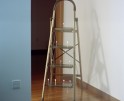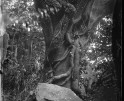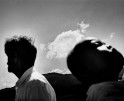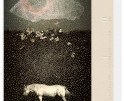Photography & Anthropology: Ignacio Navas, “Kickflip”
Ignacio Navas was born in Tudela, Spain, in 1989 and currently lives and works in Madrid. At the same time that he was studying for a Fine Arts Degree at Complutense University of Madrid, he specialized in photography at Blank Paper School, developing a strong background in documentary photography. He also studied a Master’s Degree in Cultural Management at the University Carlos III of Madrid, which led him to play an active role in cultural and collective projects. Along with other photographers he currently runs El Local, an independent space for photography in Madrid.
In his work, Navas creates daily life narratives that dig into the complexities and contradictions of western society. His approach researches how political, economic or social structures are made present and shape our everyday affaires. In his latest projects he explores new interactive paths for the medium by creating photography-based interactive experiences and non-fictional video games.
Follow Ignacio on Instagram: @ignacionavas
Right now, Navas is working on Kickflip, a photographic project presented as a video game, that materializes in an interactive audiovisual installation. This work compiles the personal history of a group of people whose adolescence converged in the same space—the skatepark of a small Spanish town called Tudela—during the 2000s decade.
In that game the viewer navigates through this place using the controller to discover the different narrative threads. These threads are composed of photographs, found documents, and voice recordings. Within each thread, a person related to this group of friends talks about their own experiences, providing new perspectives on topics related to adolescence, such as school failure, the discovery of own sexuality and identity, or the exploration of the musical subcultures. These testimonies not only reflect on the nuances of their own history, but also aim to critically review the stereotypes, behaviors, values and aspirations of middle-class teenagers who have grown up in small towns.
Carlos Barradas: What initially drew you to incorporate anthropological themes into your photography?
Ignacio Navas: For me, engaging in photographic projects is a way of comprehending life experiences, of posing questions to ourselves, and of sharing that question with the viewer. This process leads us to become aware of the complexities of the society we inhabit, of the structures that inevitably shape us. In Kickflip, these structures encompass the values prevalent in small provincial cities, the nuances of friendship, the stereotypes and role models inherited from our families, or the notion of love as portrayed in popular culture during the 2000s.
Photography is a visual medium, with its virtues and limitations. My approach is to work from everyday affairs, focusing on elements that mirror aspects of these structures, yet also often left out of the grand narrative.
Carlos Barradas: How have your personal or professional experiences significantly influenced your work?
Ignacio Navas: Kickflip treasures the personal history of my own group of friends, so personal experiences are deeply embedded in the work. Looking beyond, in the process of creating any work, many things happen, and you learn a lot. I feel that this learning evolves the project and when I realize that I’m there, is when I truly delve into the subject matter and create something meaningful.
Lately, I’ve been thinking about the experience we have doing projects. In everyday life, you assume various roles: son, boyfriend, customer, seller, worker, boss… I like to believe that creating projects is a space where you break away from all those roles. That’s why we often ask ourselves if there is sense in creating projects because social norms are subverted and we feel like we have no foothold, but it is what allows us to create meaning; it is a relief, it’s liberating in a way.
Carlos Barradas: Can you share any feedback or stories from your work that have been particularly meaningful to you?
Ignacio Navas: Sure, when we were taking photographs and recording audio for Kickflip, we visited a friend’s house, Álvaro’s. María had brought her high school agendas, and we began examining them and taking pictures. Álvaro mentioned that he also had some agendas he hadn’t seen in years, so he was excited to locate them. Other documents surfaced, including his high school grades. In the teachers’ comments, the first-year note indicated he needed to exert more effort, as he wasn’t academically enthusiastic. The second year, a different teacher remarked that he required more attention and affection from his family, emphasizing he wasn’t a troublesome student. The third-year note was broken in two, with a harsh comment urging him to try harder to avoid stagnation. The fourth-year note was similarly torn, with only the bottom part reading “Happy summer” visible. His overall grades reflected a failing mark.
Álvaro was affected by this discovery. While recording the audio, he expressed how much he hated attending school, how poorly his classmates treated him, and the deep impact it had on him. His parents’ divorce compounded the troubles. He left the high school. Years later, he returned to study, finding it much easier and achieving good grades, discovering that he was really good at that. Álvaro recounted more anecdotes from this period, highlighting the complexity underlying school failure beyond mere lack of effort or motivation.
This event changed the high school’s narrative thread and other parts of the project. Also, it made me think a lot about the relationship that we, as photographers, have with the people involved in our project, and how we should address sensitive topics for those people.
Carlos Barradas: In what ways do you negotiate the power dynamics inherent in photographing subjects?
Ignacio Navas: This is a very interesting topic that documentary photographers should think more. On one hand, there’s the ethical aspect of photography, which has been extensively discussed and it’s a key aspect of contemporary debates nowadays. The weight of representation and the dominance of one model of representation that hides others is a topic that we need to be aware of. I believe it’s important to be conscious of our position in the world and our background, and to speak honestly from there.
On the other hand, I think that by involving other people in projects, the projects inevitably becomes a collaborative effort. These people contribute as much to the project as the author does, adding their own dimension to it. We can no longer just be photographers attempting to offer a personal vision of the world by our own. Asking questions like how people want to be represented and maintaining constant communication and asking them about their feelings when something is to be published, I believe, are the basics.
Furthermore, we need to assume and accept that they have rights to the project too. For me, it shouldn’t be seen as restrictive; rather, it enriches the project because they contribute their experiences beyond the photographic process. We have to talk also about money, about the cost and profit of each project, and how different people are involved in that aspect of photography.
To be honest, I feel that I’m still learning and I may fall in contradictions sometimes. Last days, I’ve been asking myself a lot about the symbolic aspect of the medium. What does it mean to create images about a subject matter and display them? Are we just creating a product to be consumed in leisure time? What does it mean for an image to occupy a space (whether exhibition or not, physical or virtual)? If we take one action on an image, is it affecting the subject symbolically? What meanings result from that intersection? These are still questions for which I don’t have answers, but I feel that they are opening up new lines in my work.
Carlos Barradas: What impact do you hope your work will have on viewers? Are there specific reactions or discussions you aim to provoke?
Ignacio Navas: I believe that one of the functions of visual arts is to create counter-narratives. For example, the story I previously told about Álvaro, or when María talks about how she felt singing rap songs, these are part of personal stories that differ from collective knowledge. Knowing these testimonies not only helps to consider aspects of adolescence more deeply, but also make to find relationships and empathies where we usually didn’t think there were any.
More than a reaction, I would like my recent projects, projects materialized in audiovisual installations, to provoke a situation. When I was a child, I would often go to a friend’s house to play video games with our crew. The video game was an excuse to gather, and at the same time, the trigger for endless conversations. We commented on what we saw on the screen, we shared experiences and found connections between us. This experience is the reason why I bring these works to installation format, and why I design them so that they can be enjoyed collectively. It would be a dream for me if works like Kickflip create that situation among groups of viewers, whether they know each other or not. I think it’s really valuable for a work to provoke that exchange and those connections between people.
Carlos Barradas is a photographer with a Ph.D. in anthropology and a master’s degree in contemporary photography from the Istituto Europeo di Design in Madrid, he has been producing photographic and textual essays on issues such as territory, colonialism and post-colonialism, disability, new masculinities and sustainability. Considered by GUP Magazine as one of the 100 European photography talents (2020). He has already exhibited at Foto Rio, Rencontres d’Arles 2019 & 2023 (promoted by the British Journal of Photography and Der Greif), at the International Center of Photography, in New York (2020) and at the BFoto Festival (2021). Winner of the “Cities in the City” initiative at PhotoEspaña and the Porto Photography Biennale’21, awarded a Criatório (2022) and, more recently, guest artist in residence at Encontros da Imagem 2023 edition. Co-creator and co-editor of the online magazine contemporary photography line SOPA and content editor of the photography platform Lenscratch, based in Los Angeles.
In his work he engages with ambiguity. He positions his photographs in a liminal state, an anthropological concept that refers to an intermediate phase or condition in a certain rite of passage. It intends for them to become a receptacle where people deposit their narratives. In this sense, they become a habitable space, where emotional states, memories and social and cultural values come into play, defining the interpretation made of the image.
His artistic practice is developed around personal work, but also the development of free workshops for the communities he works with, always resulting in fanzines, collective exhibitions or other types of artistic products, as has happened in Portugal, São Tomé and Príncipe or Namibia. He believes that it is through these joint initiatives and the participation of communities that the visual production and the intended local cultural mapping will be richer the greater their engagement.
Follow Carlos Barradas on Instagram: @barradascarlos
Posts on Lenscratch may not be reproduced without the permission of the Lenscratch staff and the photographer.
Recommended
-
The 2026 Lenscratch New Beginnings Exhibition (Part II)January 31st, 2026
-
South Korea Week: Sung Nam Hun: The Rustling Whispers of the WindJanuary 16th, 2026
-
South Korea Week: Lee Gap-Chul: Conflict and ReactionJanuary 14th, 2026
-
The Favorite Photograph You Took in 2025 Exhibition, Part 2January 1st, 2026
-
The Favorite Photography YOU Took in 2025 Exhibition, Part 3January 1st, 2026

























































